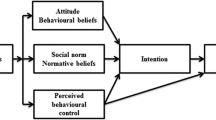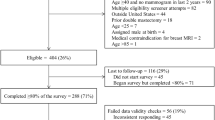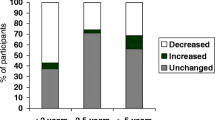Abstract
One hundred and fifty-four women undergoing breast/ovarian cancer genetic risk assessment completed questionnaires at entry into the Cancer Genetic Service for Wales (CGSW) assessment program and following risk provision, mapping the strength of intentions to engage in a number of preventive/surveillance behaviors, including seeing specialists, breast self-examination, and involvement in screening programs, including mammography. A number of potential predictors of intentions were also assessed, including participants’ mood and emotional response to receiving risk information, the perceived benefits (in terms of reassurance and early disease detection) of engaging in each preventive behavior, and the perceived desires of their family and General Practitioner. Intentions to self-examine did not change following risk provision, although strength of intentions to engage in some other preventive behaviors did lessen. Family and General Practitioners appeared to be strong social influences on behavioral intentions, as were the perceived benefits of gaining reassurance and/or early detection of disease.
Similar content being viewed by others
References
Abela, J. R., Brozina, K., & Seligman, M. E. (2004). A test of integration of the activation hypothesis and the diathesis-stress component of the hopelessness theory of depression. British Journal of Clinical Psychology, 43, 111–128.
Andersen, M. R., Smith, R., Meischke, H., Bowen, D., & Urban, N. (2003). Breast cancer worry and mammography use by women with and without a family history in a population-based sample. Cancer Epidemiology, Biomarkers & Prevention, 12, 314–320.
Bowen, D. J., Alfano, C. M., McGregor, B. A., & Andersen, M. R. (2004). The relationship between perceived risk, affect, and health behaviors. Cancer Detection and Prevention, 28, 409–417.
Brain, K., Norman, P., Gray, J., Rogers, C., Mansel, R., & Harper, P. (2002). A randomized trial of specialist genetic assessment: Psychological impact on women at different levels of familial breast cancer risk. British Journal of Cancer, 86, 233–238.
Braithwaite, D., Emery, J., Walter, F., Prevost, A. T., & Sutton, S. (2006). Psychological impact of genetic counseling for familial cancer: A systematic review and meta-analysis. Family Cancer, 5, 61–75.
Buchanan, A. H., Skinner, C. S., Rawl, S. M., Moser, B. K., Champion, V. L., Scott, L. L., et al. (2005). Patients’ interest in discussing cancer risk and risk management with primary care physicians. Patient Education and Counseling, 57, 77–87.
Cohen, M. (2006). Breast cancer early detection, health beliefs, and cancer worries in randomly selected women with and without a family history of breast cancer. Psychooncology, 15, 873–883.
Friedman, L. C., Woodruff, A., Lane, M., Weinberg, A. D., Cooper, H. P., & Webb, J. A. (1995). Breast cancer screening behaviors and intentions among asymptomatic women 50 years of age and older. American Journal of Preventive Medicine, 11, 218–223.
Fry, A., Campbell, H., Gudmunsdottir, H., Rush, R., Porteous, M., Gorman, D., et al. (1999). GPs’ views on their role in cancer genetics services and current practice. Family Practitioner, 16, 468–474.
Fry, A., Cull, A., Appleton, S., Rush, R., Holloway, S., Gorman, D., et al. (2003). A randomised controlled trial of breast cancer genetics services in South East Scotland: Psychological impact. British Journal of Cancer, 89, 653–659.
Hay, J. L., McCaul, K. D., & Magnan, R. E. (2006). Does worry about breast cancer predict screening behaviors? A meta-analysis of the prospective evidence. Preventive Medicine, 42, 401–408.
Hopwood, P. (2005). Psychosocial aspects of risk communication and mutation testing in familial breast-ovarian cancer. Current Opinion in Oncology, 17, 340–344.
Hopwood, P., Howell, A., Lalloo, F., & Evans, G. (2003). Do women understand the odds? Risk perceptions and recall of risk information in women with a family history of breast cancer. Community Genetics, 6, 214–223.
Horowitz, M., Wilner, N., & Alvarez, W. (1979). Impact of Event Scale: A measure of subjective stress. Psychosomatic Medicine, 41, 209–218.
Janz, N. K., & Becker, M. H. (1984). The Health Belief Model: A decade later. Health Education Quarterly, 11, 1–47.
Lerman, C., Kash, K., & Stefanek, M. (1994). Younger women at increased risk for breast cancer: Perceived risk, psychological well-being, and surveillance behavior. Journal of the National Cancer Institute Monographs, 16, 171–176.
Martin, W., & Degner, L. (2006). Perception of risk and surveillance practices of women with a family history of breast cancer. Cancer Nursing, 29, 227–235.
McInerney-Leo, A., Hadley, D., Kase, R. G., Giambarresi, T. R., Struewing, J. P., & Biesecker, B. B. (2006). BRCA1/2 testing in hereditary breast and ovarian cancer families. III: Risk perception and screening. American Journal of Medical Genetics A, 140, 2198–2206.
Meiser, B., Butow, P. N., Barratt, A. L., Schnieden, V., Gattas, M., Kirk, J., et al. (2001). Long-term outcomes of genetic counseling in women at increased risk of developing hereditary breast cancer. Patient Education and Counseling, 44, 215–225.
National Institute for Health and Clinical Excellence (2006). NICE clinical guideline 41. Familial breast cancer: The classification and care of women at risk of familial breast cancer in primary, secondary and tertiary care. London: NICE.
Powell-Cope, G. M., Lierman, L. M., Kasprzyk, D., Young, H. M., & Benoliel, J. Q. (1991). The theory of reasoned action in prediction of breast self-examination: A comparison of two studies. Health Care for Women International, 12, 51–61.
Schwartz, M. D., Rimer, B. K., Daly, M., Sands, C., & Lerman, C. (1999). A randomized trial of breast cancer risk counseling: The impact on self-reported mammography use. American Journal of Public Health, 89, 924–926.
Steadman, L., & Rutter, D. R. (2004). Belief importance and the theory of planned behaviour: Comparing modal and ranked modal beliefs in predicting attendance at breast screening. British Journal of Health Psychology, 9, 447–463.
Trask, P. C., Paterson, A. G., Wang, C., Hayasaka, S., Milliron, K. J., & Blumberg, L. R. (2001). Cancer-specific worry interference in women attending a breast and ovarian cancer risk evaluation program: Impact on emotional distress and health functioning. Psychooncology, 10, 349–360.
van Dijk, S., Otten, W., Zoeteweij, M. W., Timmermans, D. R., van Asperen, C. J., Breuning, M. H., et al. (2003). Genetic counselling and the intention to undergo prophylactic mastectomy: Effects of a breast cancer risk assessment. British Journal of Cancer, 88, 1675–1681.
van Dooren, S., Rijnsburger A. J., Seynaeve, C., Kriege, A., Duivenvoorden, H. J., Bartels, C. C., et al. (2003) Psychological distress and breast self-examination frequency in women at increased risk for hereditary or familial breast cancer. Community Genetics, 6, 235–241.
Watson, M., Foster, C., Eeles, R., Eccles, D., Ashley, S., & Davidson, R. (2004). Psychosocial impact of breast/ovarian (BRCA1/2) cancer-predictive genetic testing in a UK multi-centre clinical cohort. British Journal of Cancer, 91, 1787–1794.
Watson, M., Kash, K. M., Homewood, J., Ebbs, S., Murday, V., & Eeles R. (2005). Does genetic counseling have any impact on management of breast cancer risk? Genet Test, 9, 167–174.
Webb, T. L., & Sheeran, P. (2006). Does changing behavioral intentions engender behavior change? A meta-analysis of the experimental evidence. Psychological Bulletin, 132, 249–268.
Zigmond, A. S., & Snaith, R. P. (1983). The hospital anxiety and depression scale. Acta Psychiatrica Scandinavica, 67, 361–370.
Conflict of Interest
There are no potential conflicts regarding conducting this research or publication of its results.
Author information
Authors and Affiliations
Corresponding author
Rights and permissions
About this article
Cite this article
Bennett, P., Wilkinson, C., Turner, J. et al. The Impact of Breast Cancer Genetic Risk Assessment on Intentions to Perform Cancer Surveillance Behaviors. J Genet Counsel 16, 617–623 (2007). https://doi.org/10.1007/s10897-007-9100-9
Received:
Accepted:
Published:
Issue Date:
DOI: https://doi.org/10.1007/s10897-007-9100-9




